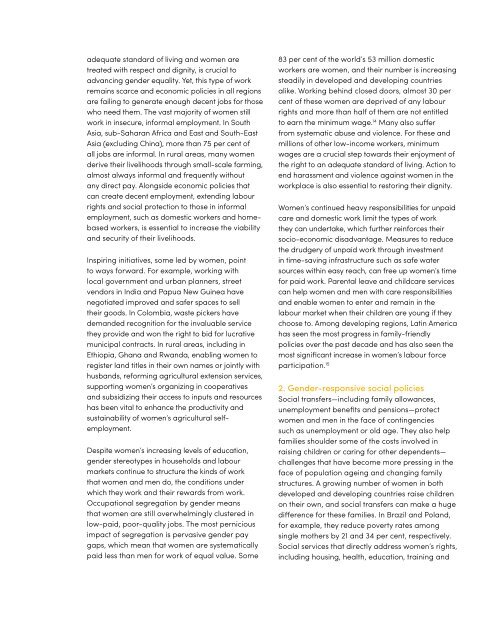1GzuFGC
1GzuFGC
1GzuFGC
Create successful ePaper yourself
Turn your PDF publications into a flip-book with our unique Google optimized e-Paper software.
adequate standard of living and women aretreated with respect and dignity, is crucial toadvancing gender equality. Yet, this type of workremains scarce and economic policies in all regionsare failing to generate enough decent jobs for thosewho need them. The vast majority of women stillwork in insecure, informal employment. In SouthAsia, sub-Saharan Africa and East and South-EastAsia (excluding China), more than 75 per cent ofall jobs are informal. In rural areas, many womenderive their livelihoods through small-scale farming,almost always informal and frequently withoutany direct pay. Alongside economic policies thatcan create decent employment, extending labourrights and social protection to those in informalemployment, such as domestic workers and homebasedworkers, is essential to increase the viabilityand security of their livelihoods.Inspiring initiatives, some led by women, pointto ways forward. For example, working withlocal government and urban planners, streetvendors in India and Papua New Guinea havenegotiated improved and safer spaces to selltheir goods. In Colombia, waste pickers havedemanded recognition for the invaluable servicethey provide and won the right to bid for lucrativemunicipal contracts. In rural areas, including inEthiopia, Ghana and Rwanda, enabling women toregister land titles in their own names or jointly withhusbands, reforming agricultural extension services,supporting women’s organizing in cooperativesand subsidizing their access to inputs and resourceshas been vital to enhance the productivity andsustainability of women’s agricultural selfemployment.Despite women’s increasing levels of education,gender stereotypes in households and labourmarkets continue to structure the kinds of workthat women and men do, the conditions underwhich they work and their rewards from work.Occupational segregation by gender meansthat women are still overwhelmingly clustered inlow-paid, poor-quality jobs. The most perniciousimpact of segregation is pervasive gender paygaps, which mean that women are systematicallypaid less than men for work of equal value. Some83 per cent of the world’s 53 million domesticworkers are women, and their number is increasingsteadily in developed and developing countriesalike. Working behind closed doors, almost 30 percent of these women are deprived of any labourrights and more than half of them are not entitledto earn the minimum wage. 14 Many also sufferfrom systematic abuse and violence. For these andmillions of other low-income workers, minimumwages are a crucial step towards their enjoyment ofthe right to an adequate standard of living. Action toend harassment and violence against women in theworkplace is also essential to restoring their dignity.Women’s continued heavy responsibilities for unpaidcare and domestic work limit the types of workthey can undertake, which further reinforces theirsocio-economic disadvantage. Measures to reducethe drudgery of unpaid work through investmentin time-saving infrastructure such as safe watersources within easy reach, can free up women’s timefor paid work. Parental leave and childcare servicescan help women and men with care responsibilitiesand enable women to enter and remain in thelabour market when their children are young if theychoose to. Among developing regions, Latin Americahas seen the most progress in family-friendlypolicies over the past decade and has also seen themost significant increase in women’s labour forceparticipation. 152. Gender-responsive social policiesSocial transfers—including family allowances,unemployment benefits and pensions—protectwomen and men in the face of contingenciessuch as unemployment or old age. They also helpfamilies shoulder some of the costs involved inraising children or caring for other dependents—challenges that have become more pressing in theface of population ageing and changing familystructures. A growing number of women in bothdeveloped and developing countries raise childrenon their own, and social transfers can make a hugedifference for these families. In Brazil and Poland,for example, they reduce poverty rates amongsingle mothers by 21 and 34 per cent, respectively.Social services that directly address women’s rights,including housing, health, education, training and


